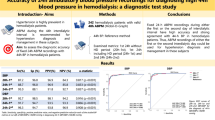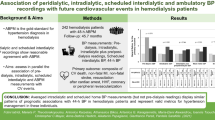Abstract
Background
The blood pressure (BP) burden is high in pediatric hemodialysis (HD) patients and adversely affects prognosis. The aim of this study was to examine whether 44-h ambulatory BP monitoring (ABPM) provides additional relevant BP data compared with 24-h ABPM.
Methods
ABPM was initiated at the end of the mid-week dialysis run in 13 stable pediatric HD patients and continued until the next run for 44 h. Day 1 was defined as the initial 24-h ABPM and Day 2 as the time period after that until the next dialysis run. All patients had an echocardiogram to calculate the left ventricular mass index (LVMI).
Results
A higher percentage of patients were diagnosed with hypertension from the 44-h ABPM than from the 24-h ABPM. All BP indexes and loads (except nighttime diastolic load) were significantly higher on Day 2 than on Day 1. Patients with BP loads of ≥25 % on 44-h ABPM had significantly higher LVMI than those patients with normal BP loads. No such association was found with 24-h ABPM and LVMI. Higher interdialytic weight gain was associated with higher Day-2 nighttime systolic BP load.
Conclusions
The 44-h ABPM provides more information than the 24-h ABPM in terms of diagnosing and assessing the true burden of hypertension in pediatric HD patients. Elevated BP loads from 44-h ABPM correlate with a higher LVMI on the echocardiogram.



Similar content being viewed by others
References
Chavers BM, Solid CA, Daniels FX, Chen SC, Collins AJ, Frankenfield DL, Herzog CA (2009) Hypertension in pediatric long-term hemodialysis patients in the United States. Clin J Am Soc Nephrol 4:1363–1369
Chaudhuri A, Sutherland SM, Begin B, Salsbery K, McCabe L, Potter D, Alexander SR, Wong CJ (2011) Role of twenty-four-hour ambulatory blood pressure monitoring in children on dialysis. Clin J Am Soc Neprol 6:870–876
Halbach SM, Martz K, Mattoo T, Flynn J (2012) Predictors of blood pressure and its control in pediatric patients receiving dialysis. J Pediatr 160(621–625):e621
North American Pediatric Renal Trials and Collaborative Studies (NARTCS) (2011). Annual dialysis report. NARTCS, Boston
Agarwal R, Peixoto AJ, Santos SF, Zoccali C (2006) Pre- and postdialysis blood pressures are imprecise estimates of interdialytic ambulatory blood pressure. Clin J Am Soc Nephrol 1:389–398
Agarwal R (2010) Blood pressure and mortality among hemodialysis patients. Hypertension 55:762–768
Ekart R, Kanic V, Pecovnik Balon B, Bevc S, Hojs R (2012) Prognostic value of 48-h ambulatory blood pressure measurement and cardiovascular mortality in hemodialysis patients. Kidney Blood Press Res 35:326–331
Stabouli S, Kotsis V, Toumanidis S, Papamichael C, Constantopoulos A, Zakopoulos N (2005) White-coat and masked hypertension in children: association with target-organ damage. Pediatr Nephrol 20:1151–1155
Swartz SJ, Srivaths PR, Croix B, Feig DI (2008) Cost-effectiveness of ambulatory blood pressure monitoring in the initial evaluation of hypertension in children. Pediatrics 122:1177–1181
Samuels J, Ng D, Flynn JT, Mitsnefes M, Poffenbarger T, Warady BA, Furth S; Chronic Kidney Disease in Children Study G (2012) Ambulatory blood pressure patterns in children with chronic kidney disease. Hypertension 60:43–50
National Heart, Lung and Blood Institute, National Institutes of Health (2004) The fourth report on the diagnosis, evaluation and treatment of high blood pressure in children and adolescents. Pediatrics 114:555–576
Urbina E, Alpert B, Flynn J, Hayman L, Harshfield GA, Jacobson M, Mahoney L, McCrindle B, Mietus-Snyder M, Steinberger J, Steinberger J, Daniels S (2008) Recommendations for standard assessment—A scientific statement from the American Heart Association Atherosclerosis, Hypertension, and Obesity in Youth Committee of the council on cardiovascular disease in the young and the council for high blood pressure research. Hypertension 52:433–451
Flynn JT, Daniels SR, Hayman LL, Maahs DM, McCrindle BW, Mitsnefes M, Zachariah JP, Urbina EM (2014) Update: ambulatory blood pressure monitoring in children and adolescents: a scientific statement from the American Heart Association. Hypertension 63:1116–1135
Koshy S, Macarthur C, Luthra S, Gajaria M, Geary D (2005) Ambulatory blood pressure monitoring: mean blood pressure and blood pressure load. Pediatr Nephrol 20:1484–1486
Daniels SR, Kimball TR, Morrison JA, Khoury P, Meyer RA (1995) Indexing left ventricular mass to account for differences in body size in children and adolescents without cardiovascular disease. Am J Cardiol 76:699–701
de Simone G, Daniels SR, Devereux RB, Meyer RA, Roman MJ, de Divitiis O, Alderman MH (1992) Left ventricular mass and body size in normotensive children and adults: assessment of allometric relations and impact of overweight. J Am Coll Cardiol 20:1251–1260
Khoury PR, Mitsnefes M, Daniels SR, Kimball TR (2009) Age-specific reference intervals for indexed left ventricular mass in children. J Am Soc Echocardiogr 22:709–714
Sorof JM, Cardwell G, Franco K, Portman RJ (2002) Ambulatory blood pressure and left ventricular mass index in hypertensive children. Hypertension 39:903–908
White WB, Dey HM, Schulman P (1989) Assessment of the daily blood pressure load as a determinant of cardiac function in patients with mild-to-moderate hypertension. Am Heart J 118:782–795
Liu M, Takahashi H, Morita Y, Maruyama S, Mizuno M, Yuzawa Y, Watanabe M, Toriyama T, Kawahara H, Matsuo S (2003) Non-dipping is a potent predictor of cardiovascular mortality and is associated with autonomic dysfunction in haemodialysis patients. Nephrol Dial Transplant 18:563–569
Erturk S, Ertug AE, Ates K, Duman N, Aslan SM, Nergisoglu G, Diker E, Erol C, Karatan O, Erbay B (1996) Relationship of ambulatory blood pressure monitoring data to echocardiographic findings in haemodialysis patients. Nephrol Dial Transplant 11:2050–2054
Sharma AP, Mohammed J, Thomas B, Lansdell N, Norozi K, Filler G (2013) Nighttime blood pressure, systolic blood pressure variability, and left ventricular mass index in children with hypertension. Pediatr Nephrol 28:1275–1282
Sorof JM, Brewer ED, Portman RJ (1999) Ambulatory blood pressure monitoring and interdialytic weight gain in children receiving chronic hemodialysis. Am J Kidney Dis 33:667–674
Tonbul Z, Altintepe L, Sozlu C, Yeksan M, Yildiz A, Turk S (2002) Ambulatory blood pressure monitoring in haemodialysis and continuous ambulatory peritoneal dialysis (CAPD) patients. J Hum Hypertens 16:585–589
Mominadam S, Ozkahya M, Kayikcioglu M, Toz H, Asci G, Duman S, Ergin P, Kirbiyik S, Ok E, Basci A (2008) Interdialytic blood pressure obtained by ambulatory blood pressure measurement and left ventricular structure in hypertensive hemodialysis patients. Hemodial Int 12:322–327
Fagugli RM, Ricciardi D, Rossi D, De Gaetano A, Taglioni C (2009) Blood pressure assessment in haemodialysis patients: comparison between pre-dialysis blood pressure and ambulatory blood pressure measurement. Nephrology 14:283–290
Lingens N, Soergel M, Loirat C, Busch C, Lemmer B, Scharer K (1995) Ambulatory blood pressure monitoring in paediatric patients treated by regular haemodialysis and peritoneal dialysis. Pediatr Nephrol 9:167–172
Inrig JK, Patel UD, Gillespie BS, Hasselblad V, Himmelfarb J, Reddan D, Lindsay RM, Winchester JF, Stivelman J, Toto R, Szczech LA (2007) Relationship between interdialytic weight gain and blood pressure among prevalent hemodialysis patients. Am J Kidney Dis 50:108–118, 118.e101–104
Rocco MV, Yan G, Heyka RJ, Benz R, Cheung AK; HEMO Study Group (2001) Risk factors for hypertension in chronic hemodialysis patients: baseline data from the HEMO study. Am J Nephrol 21:280–288
Koc Y, Unsal A, Kayabasi H, Oztekin E, Sakaci T, Ahbap E, Yilmaz M, Akgun AO (2011) Impact of volume status on blood pressure and left ventricle structure in patients undergoing chronic hemodialysis. Ren Fail 33:377–381
Mitsnefes MM, Daniels SR, Schwartz SM, Meyer RA, Khoury P, Strife CF (2000) Severe left ventricular hypertrophy in pediatric dialysis: prevalence and predictors. Pediatr Nephrol 14:898–902
Schmieder RE, Martus P, Klingbeil A (1996) Reversal of left ventricular hypertrophy in essential hypertension. A meta-analysis of randomized double-blind studies. JAMA 275:1507–1513
Yancy CW, Jessup M, Bozkurt B, Butler J, Casey DE Jr, Drazner MH, Fonarow GC, Geraci SA, Horwich T, Januzzi JL, Johnson MR, Kasper EK, Levy WC, Masoudi FA, McBride PE, McMurray JJ, Mitchell JE, Peterson PN, Riegel B, Sam F, Stevenson LW, Tang WH, Tsai EJ, Wilkoff BL (2013) 2013 ACCF/AHA guideline for the management of heart failure: executive summary: a report of the American College of Cardiology Foundation/American Heart Association Task Force on practice guidelines. Circulation 128:1810–1852
Ruggenenti P, Iliev I, Costa GM, Parvanova A, Perna A, Giuliano GA, Motterlini N, Ene-Iordache B, Remuzzi G; Bergamo Nephrologic Diabetes Complications Trial Study G (2008) Preventing left ventricular hypertrophy by ACE inhibition in hypertensive patients with type 2 diabetes: a prespecified analysis of the Bergamo Nephrologic Diabetes Complications Trial (BENEDICT). Diabetes Care 31:1629–1634
Agarwal R, Flynn J, Pogue V, Rahman M, Reisin E, Weir MR (2014) Assessment and management of hypertension in patients on dialysis. J Am Soc Nephrol 25:1630–1646
Acknowledgments
This work is supported by the Stanford CTSA (UL1 RR025744) “The Paul and Yuanbi Ramsay Endowed Postdoctoral Fellow”.
Author information
Authors and Affiliations
Corresponding author
Rights and permissions
About this article
Cite this article
Haskin, O., Wong, C.J., McCabe, L. et al. 44-h ambulatory blood pressure monitoring: revealing the true burden of hypertension in pediatric hemodialysis patients. Pediatr Nephrol 30, 653–660 (2015). https://doi.org/10.1007/s00467-014-2964-7
Received:
Revised:
Accepted:
Published:
Issue Date:
DOI: https://doi.org/10.1007/s00467-014-2964-7




